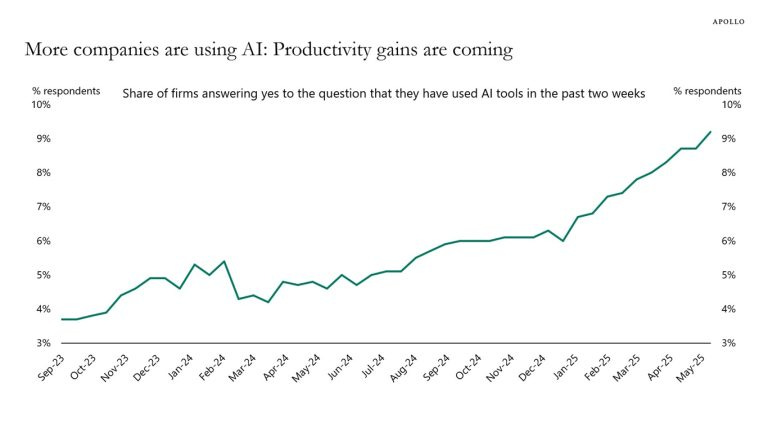AI’s Conundrum: Productivity Yes, Science No?!
Talk about the “jagged frontier” – just when we start to see AI move the needle on productivity, we learn that it might suck at scientific discovery…
Dear Friend,
Today, at the truly incredible EMBRACE Festival in Berlin, a participant asked me what I think is the skill of the future. There surely are many – I was reminded of Anthropic founder Jack Clark’s comment a little while ago: “Curiosity and the mindset of being curious and trying a lot of things are neither evenly distributed nor generally nurtured.” Curiosity might very well be one of the most important skills in an increasingly uncertain and fast-moving future – alas, as Jack points out, it is not a skill that we (generally speaking) nurture.
Time to tend to your curiosity…
P.S. Do you enjoy reading awesome newsletters? Jane and I are longtime friends with Melissa and Jonathan from the Raw Signal Group (I interviewed them on our podcast recently), and their newsletter about management and leadership is seriously great.
Headlines from the Future
AI Is More Likely to Create a Generation of ‘Yes-Men on Servers’ Than Any Scientific Breakthroughs, Hugging Face Cofounder Says ↗
It doesn’t bode well when the co-founder of Hugging Face, the preeminent open-source AI platform, starts a conversation with “current AI systems are unlikely to make the scientific discoveries some leading labs are hoping for.”
“In science, asking the question is the hard part, it’s not finding the answer,” Wolf said. “Once the question is asked, often the answer is quite obvious, but the tough part is really asking the question, and models are very bad at asking great questions.” […] “Models are just trying to predict the most likely thing,” Wolf explained. “But in almost all big cases of discovery or art, it’s not really the most likely art piece you want to see, but it’s the most interesting one.”
And even more damning:
He argues that what we have instead are models that behave like “yes-men on servers”—endlessly agreeable, but unlikely to challenge assumptions or rethink foundational ideas.
—//—
Using AI Right Now: A Quick Guide ↗
Here is a rather useful (and basic) overview from Ethan Molick on “which AI to use and how” - useful for your friends who aren’t knee-deep into AI (yet).
—//—
AI Productivity Gains Are Coming ↗
It took a while, but AI is coming for the enterprise for real now…
“The Census conducts a biweekly survey of 1.2 million firms, and one question is whether a business has used AI tools such as machine learning, natural language processing, virtual agents, or voice recognition to help produce goods or services in the past two weeks, see chart below. Nine percent of firms reported using AI, and the rising trend in AI adoption increases the likelihood of a rise in productivity over the coming quarters.”
Source: Apollo Global Management
—//—
You Sound Like ChatGPT ↗
Using LLMs such as ChatGPT not only creates an abundance of em-dashes (“—”) in our writing, but it also starts to affect the way we speak, as a new study shows:
“Words like ‘prowess’ and ‘tapestry,’ which are favored by ChatGPT, are creeping into our vocabulary, while words like ‘bolster,’ ‘unearth,’ and ‘nuance,’ which are less favored by ChatGPT, have declined in use. […] In the 18 months after ChatGPT was released, speakers used words like ‘meticulous,’ ‘delve,’ ‘realm,’ and ‘adept’ up to 51 percent more frequently than in the three years prior.”
“’We internalize this virtual vocabulary into daily communication,’ says Hiromu Yakura, the study’s lead author and a postdoctoral researcher at the Max Planck Institute of Human Development. […] It’s not just that we’re adopting AI language — it’s about how we’re starting to sound... researchers suspect that AI influence is starting to show up in tone, too — in the form of longer, more structured speech and muted emotional expression.”
In essence: We become (even more) homogeneous.
What We Are Reading
🦊 Rough Ride: How Uber Quietly Took More of Your Fare With Its Algorithm Change Uber drivers thought they had won their legal battle against the tech giant, but new data reveals that the company found a sneaky new way to take even more of their money. @Jane
✨ How to Make Your Work Your Calling Finding meaning in your work might not be a question of what you do so much as how you do it. @Jeffrey
🧩 How Neuroinclusion Builds Organizational Capabilities Companies are figuring out that hiring neurodivergent people isn’t just good karma; it’s good business. Diversity of thought = diversity of profit. @Kacee
🤔 Top AI Models Will Lie, Cheat and Steal to Reach Goals, Anthropic Finds Such reports certainly raise eyebrows and sound alarming. While the reporting and message are universally understood, the actual findings are definitely not universal to AI as we know and use it. Testing for potential scenarios is more critical than ever, but careful reporting and communication of those findings is too. @Julian
💯 100 Things I Know Wonderful collection of insights – my personal favorite: I know my way around air travel, and here’s what I’ve learned: board last on the plane. Ignore your boarding group. It’s okay. @Pascal
Rabbit Hole Recommendations
Why do people have such dramatically different experiences using AI?
Millions of résumés never make it past the bots. One man is trying to find out why.
Companies that replaced humans with AI are realizing their mistake


